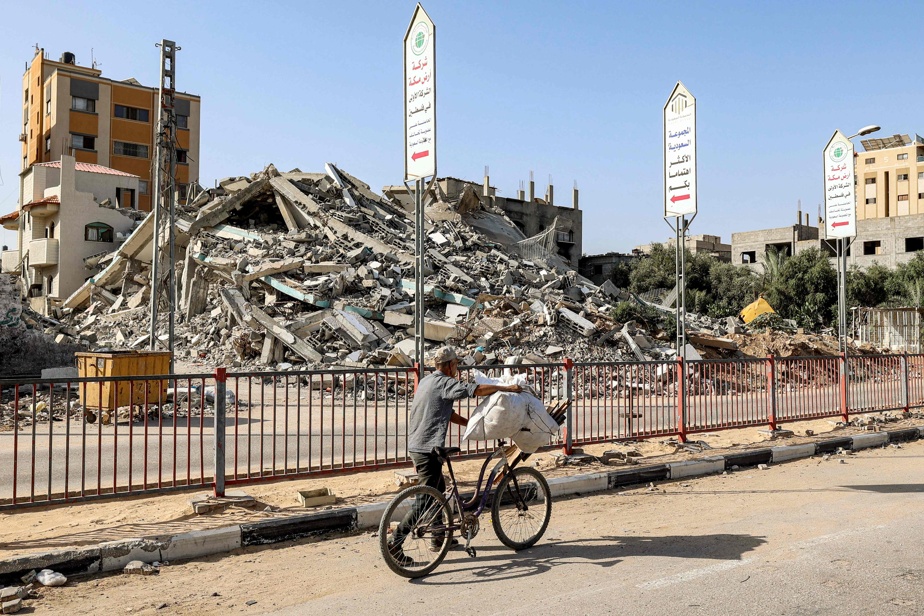The Israeli army announced on Saturday that it had freed four hostages during a “special operation” in the center of the Gaza Strip, an area targeted by intense bombardments for several days.
In the ninth month of the war between Israel and the Palestinian Islamist movement Hamas, Prime Minister Benjamin Netanyahu is under strong pressure abroad for his conduct of the war in Gaza, but also internally with that of the families of the kidnapped hostages during the unprecedented attack on Israeli soil by Hamas on October 7, which sparked hostilities.
Saturday morning, during “a difficult special daytime operation in Nusseirat, four Israeli hostages were freed,” the Israeli army wrote in a statement.
They are Noa Argamani, 25, Almog Meir Jan, 21, Andrey Kozlov, 27, and Shlomi Ziv, 40, all four “abducted” from the site of the Nova electro music festival, according to army.
Israeli strikes have focused in recent days on the center of the Gaza Strip and in particular on Nusseirat where one of them on a school of the UN agency for Palestinian refugees (UNRWA), left 37 dead on Thursday according to a local hospital.
Accusing Hamas of having purposely used this school to launch attacks, the Israeli army said it had killed “17 terrorists” during this strike. Hamas, which declared that 14 children had died, denounced “false information”.
The head of Unrwa, Philippe Lazzarini, accused Israel of having struck “without prior warning” this school in Nousseirat which sheltered, according to him, “6,000 people displaced” by the fighting.
Before its announcement on the hostages, the Israeli army said on Saturday that it was targeting “terrorist infrastructure” in the Nusseirat sector, while witnesses reported shooting from drones and helicopters against the camp.
Doctors and the Hamas Health Ministry said the Al Aqasa Martyrs Hospital received dead and injured people after intense bombardment in the central Gaza Strip.
In al-Bureij camp, six people were killed and several injured in an Israeli rocket attack targeting a house, according to doctors at Al-Aqsa Martyrs Hospital.
Intense fighting between the army and Palestinian fighters is taking place in this camp and the neighboring al-Maghazi camp, according to witnesses.
In a statement, the Israeli army said it struck “dozens of terrorist cells and infrastructure, including a tunnel located in a civilian structure” during operations in Bureij and Deir al-Balah.
In the north, five people were killed and seven injured in a nighttime aerial bombardment on a house in the Sheikh Radwane neighborhood of Gaza City, a doctor at the Baptist Hospital and Gaza Civil Defense said.
“We heard the sound of a huge explosion […] We went there and discovered human remains of children, women and elderly people,” said Mohammad Abou Nahl, a resident of Gaza.
The attack carried out on October 7 by Hamas commandos infiltrated from Palestinian territory resulted in the deaths of 1,194 people, the majority civilians, according to an AFP count based on official data.
In this attack, 251 people were taken as hostages. After a short truce in November which allowed the release of around a hundred of them, 116 hostages are still being held in Gaza, 41 of whom are dead, according to the Israeli army.
In response to the October 7 attack, the Israeli army launched a deadly offensive in the small coastal territory where Hamas took power in 2007. At least 36,801 Palestinians, mostly civilians, were killed, according to reports. data from the Health Ministry of the Hamas-led Gaza government.
The conflict has devastated much of the Gaza Strip and uprooted most of its 2.4 million residents who face the risk of famine. International aid, whose entry into Gaza is controlled by Israel, only reaches the territory in trickles.
In Israel, Benny Gantz, the former head of the army who became Benyamin Netanyahu’s political rival, who was to announce his resignation on Saturday evening, canceled his intervention, according to Israeli media, shortly before the declaration on the release of the hostages.
On May 18, he issued an ultimatum to Mr. Netanyahu, demanding the adoption, by June 8, of an “action plan” on the post-war in the Gaza Strip, failing which he would be “forced to resign from the government”, which he had joined after October 7.
While diplomatic efforts to secure a truce stall, US Secretary of State Antony Blinken is expected next week in Israel, Egypt, Qatar and Jordan, to “promote a ceasefire proposal” presented recently by President Joe Biden, according to Washington.
According to the Wall Street Journal, citing sources familiar with the matter, Qatar and Egypt recently threatened Hamas officials with arrest and expulsion from Doha, where they are based, if they did not agree to a truce with Israel.




